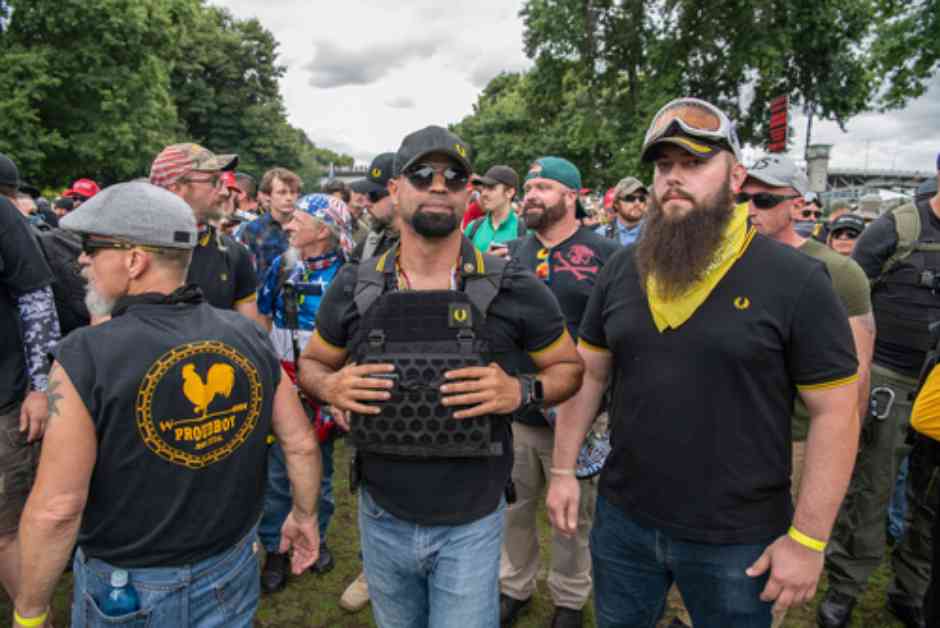A Washington, D.C., church has gained control of the trademark owned by the far-right group Proud Boys International, following an injunction issued by Judge Tanya M. Jones Bosier of the District of Columbia Superior Court on February 3. This decision comes after the Metropolitan African Methodist Episcopal Church in Washington, D.C., sued the Proud Boys for vandalizing their property in December 2020, resulting in a $2.8 million default judgment in favor of the church.
The ruling not only transferred ownership of the trademark to the church but also prohibited Proud Boys International from selling or licensing the trademark without court approval or the consent of the church. This means that Proud Boys chapters nationwide are now legally restricted from using their name or traditional symbols without the church’s permission.
The legal battle between the church and the Proud Boys traces back to a June 2023 decision by Judge Neal E. Kravitz, who found the Proud Boys guilty of trespassing on church property and destroying a Black Lives Matter sign during a march. The church, represented by the Lawyers’ Committee for Civil Rights Under Law, the Washington Lawyers’ Committee for Civil Rights and Urban Affairs, and Paul, Weiss, Rifkind, Wharton & Garrison, sought justice for the damages caused.
Notably, one of the defendants in the lawsuit was Enrique Tarrio, a former Proud Boys leader who received a 22-year prison sentence for his involvement in planning the January 6, 2021, U.S. Capitol attack. Despite not being present at the Capitol during the attack, Tarrio was prohibited from entering the city due to previous vandalism charges. Interestingly, President Donald Trump recently pardoned Tarrio for his convictions related to the Capitol attack.
In response to the trademark injunction, Tarrio took to X, formerly known as Twitter, to express his discontent, accusing the church of harassment and spreading falsehoods. He called for an investigation into Judge Bosier’s conduct and suggested impeachment, adding a layer of controversy to the legal proceedings.
The transfer of the Proud Boys trademark to the Metropolitan African Methodist Episcopal Church marks a significant victory for the church and a setback for the far-right group. This development not only holds the Proud Boys accountable for their actions but also sets a precedent for protecting the rights of targeted communities against acts of vandalism and destruction.
Expert Insights: Trademark Law Implications
Trademark law experts have weighed in on the implications of the court’s decision to transfer the Proud Boys trademark to the church. According to legal analyst Sarah Thompson, “This case sets a powerful precedent for holding extremist groups accountable for their actions. By restricting the unauthorized use of the Proud Boys trademark, the court is sending a clear message that hate-fueled activities will not go unchecked.”
Thompson further explains, “Trademarks are valuable assets that reflect the identity and reputation of an organization. By granting control of the trademark to the church, the court is not only providing restitution for the damages incurred but also safeguarding the church’s brand from future misuse by the Proud Boys or affiliated groups.”
The legal implications of this landmark decision extend beyond the financial aspects to symbolize a broader stance against hate crimes and acts of vandalism that target marginalized communities. As the legal proceedings unfold, the impact of this case on trademark law and civil rights enforcement will continue to resonate in legal circles and public discourse alike.
Community Response: Standing Against Hate
The community response to the court’s decision reflects a collective stance against hate and intolerance. Reverend Samuel Jackson of the Metropolitan African Methodist Episcopal Church expressed gratitude for the court’s ruling, stating, “This victory is not just about a trademark; it’s about standing up against bigotry and defending the values of inclusivity and respect.”
Local residents and activists have rallied in support of the church, organizing peaceful demonstrations and solidarity events to show unity in the face of adversity. The transfer of the Proud Boys trademark serves as a symbol of resilience and justice, signaling a turning point in the ongoing fight against extremist ideologies that seek to threaten the fabric of society.
As the community continues to heal from the damages caused by the Proud Boys’ actions, the court’s decision stands as a beacon of hope and accountability, reminding us all of the power of justice and solidarity in the face of hatred and division.















